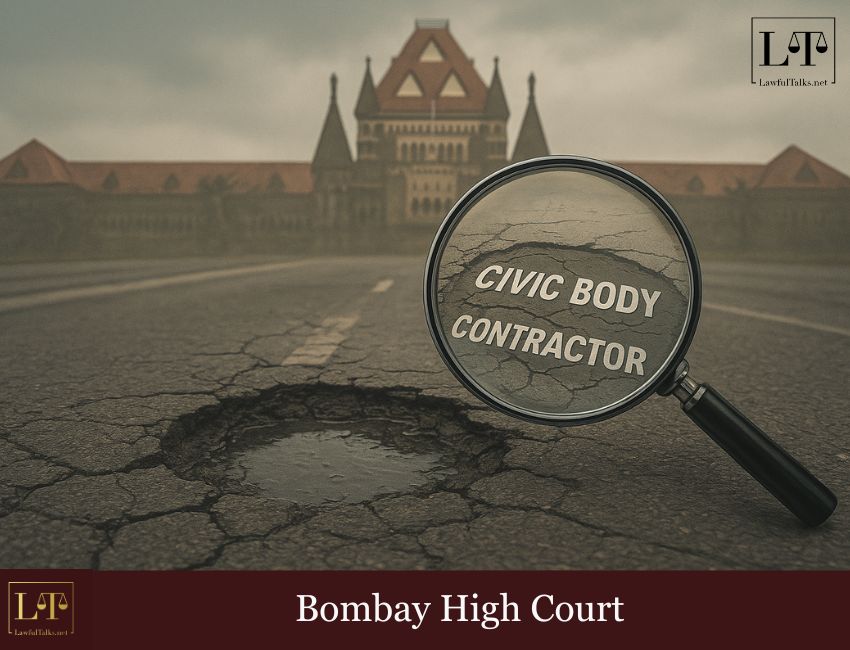Allahabad HC Sets Aside Afzal Ansari's Conviction, Allows Him to Continue as MP

In a landmark ruling, the Bombay High Court has directed that in all future cases where citizens die or are injured due to potholes or unsafe road conditions, both the civic authorities and the contractors responsible for road construction and maintenance will be held liable to pay compensation.

The Division Bench of Justice Revati Mohite-Dere and Justice Sandesh Patil has ordered that ₹6 lakh be paid to the legal heirs of deceased victims, while those who sustain injuries are to receive compensation ranging between ₹50,000 to ₹2.5 lakh, depending on the gravity of the injury. The Bench clarified that this monetary relief is independent of and in addition to the remedies available under private or criminal law.
Facts:
The order forms part of a continuing public interest litigation that was initiated in 2013, when the High Court took suo motu cognizance of the worsening condition of roads in Mumbai and other parts of Maharashtra.
The proceedings were triggered by a letter addressed by Justice G.S. Patel, (Retd), who highlighted the alarming number of accidents and fatalities caused by potholes, open manholes, and uneven road surfaces. The Court converted the letter into a Public Interest Litigation, treating it as a matter concerning the right to life and safety of citizens under Article 21 of the Constitution of India.
Since then, several benches of the Bombay High Court have monitored the issue over the years, passing repeated directions to the State Government, Municipal Corporations, and development authorities such as the Brihanmumbai Municipal Corporation (BMC), Mumbai Metropolitan Region Development Authority (MMRDA), Maharashtra State Road Development Corporation Ltd (MSRDC), Public Works Department (PWD), and others.
The aim was to ensure a coordinated framework for road construction, scientific maintenance, and accountability of contractors.
The Court had previously directed that all road agencies be brought under a single nodal authority to ensure uniformity in road standards and safety measures. It also issued instructions for regular inspections, grievance redressal systems for citizens, and audits of road quality. Despite these consistent judicial efforts and assurances from the State, the reality on the ground remained grim.
Year after year, during the monsoon season, the same incidents reoccurred – accidents, injuries, and deaths caused by poorly maintained or unrepaired roads. The authorities continued to engage in what the Court described as a “blame game,” shifting responsibility from one agency to another while citizens continued to suffer loss of life and limb. The Bench noted that the lack of inter-departmental coordination and negligence in monitoring contractors had rendered earlier directions ineffective.
Against this backdrop, the present order marks a decisive shift –from simple warnings to real accountability, holding public officers and private contractors personally and financially responsible.
Significant Judicial Observations:
The Division Bench expressed deep concern over the continuing negligence of the authorities despite multiple judicial directives spanning over a decade. The Court’s tone throughout the judgment conveyed frustration and urgency, reflecting its resolve to move beyond lip service and ensure concrete action.
The judges recorded that despite several directions, “nothing tangible appears to have been done till date,” observing that such deaths had become a “regular feature during the monsoon.” The judges noted:
“Although several directions have been issued by this Court, and assurances have been given by the State that all agencies would be brought under the overall control of the Brihanmumbai Municipal Corporation (BMC), nothing tangible appears to have been done till date. Deaths and serious injuries caused due to potholes and open manholes have become a regular feature during the monsoon. It is high time that civic authorities, along with the contractors entrusted with road maintenance, are held accountable for such deaths and injuries. We find no seriousness on the part of the authorities in addressing this perennial problem. Unless civic authorities are made accountable, this tragic scenario will continue to repeat itself every year. Accountability must be fixed not only on the contractors but also on the civic authorities themselves,”
The court specified that the majority of victims of such accidents are two-wheeler riders from middle and lower-income groups, often the sole earning members of their families. The judges held that to deny compensation in such cases would be equivalent to trivializing citizens’ constitutional rights:
“The majority of persons sustaining injuries or losing their lives due to potholes are two-wheeler riders, largely belonging to the middle and low-income groups. They are often the sole breadwinners of their families, and their loss results in irreparable financial and emotional hardship to their dependents. In fact, to refuse to award compensation in a petition involving pothole-related deaths or injuries, and merely to remind the civic authorities of their duties, would amount to rendering mere lip service to the citizens' fundamental right to safe roads, a right which has been grossly violated. Compensation must necessarily be awarded for such deaths and injuries, so that the State and civic authorities are compelled to put their house in order by initiating appropriate action against delinquent officers and defaulting contractors/engineers, responsible for the pathetic road condition,” the order reads.
The Bench found that poor materials, hasty construction, and substandard maintenance were recurring causes behind the short lifespan of newly constructed roads. Citing the stark contrast between decades-old roads that remain intact and new ones that crumble within days, the Court remarked:
“This clearly indicates poor quality of materials and substandard workmanship in road construction. Though some municipal corporations have claimed to have taken action against contractors by imposing fines, such measures have not resolved the problem. There is little doubt that those who are obliged to maintain the roads under the Municipal Laws are not doing their jobs effectively as they sound. Unless those responsible for pothole-related deaths and injuries are made personally accountable, and are compelled to bear monetary liability from their own pockets, they will not understand the gravity of the issue.”
Going beyond routine administrative warnings, the court made it clear that officials will be held financially responsible for negligence in their duties.
“Accountability shall henceforth be fixed on officers and contractors to ensure that public revenue collected for infrastructure is effectively and faithfully utilised for its intended purpose. It is the duty of all Authorities to ensure that roads are constructed and maintained in such a manner that they do not require repairs for a minimum period of five to ten years. It is observed that there are roads within Mumbai, Pune, and certain other cities which have remained intact without any repairs for decades. The Authorities shall bear the aforesaid in mind while awarding contracts for construction and maintenance of roads to contractors,”
The Court also linked the issue of bad roads directly to fundamental rights, underscoring that the right to life under Article 21 of the Constitution of India encompasses the right to safe and motorable roads:
“In fact, the MCGM is one of the richest corporations in Asia. Bad roads not only endanger human lives but also have adverse consequences for the economy, including the financial health of companies. It is the responsibility of the civic authorities and State agencies to provide proper civic amenities, including safe roads, to the taxpaying public. It is not only a responsibility but a duty of the authorities concerned,” the Bench underlined.
Reiterating this constitutional dimension, the Court observed:
“With the onset of monsoon, potholes and dilapidated roads once again come to the fore. It cannot be disputed that every person is entitled to live with dignity, as guaranteed under Article 21 of the Constitution of India. The right to life under Article 21 has been expansively interpreted to mean not mere existence but a life with dignity and meaning. Good and safe roads are an essential component of such a meaningful life. It is, therefore, imperative that all civic bodies and State agencies discharge their constitutional and legal obligations by ensuring proper roads throughout the year. Failure to do so, results in a clear infringement of the valuable fundamental rights of citizens, and exposes these authorities to serious legal consequences.”
Further, the Court expanded the scope of this right to include safe footpaths and obstruction-free passage:
“The basic object of making footpaths/footways which are a part of street is to allow the citizens to walk and travel from one place to another. If obstructions are created on the streets or footpaths in such a manner that it prevents the citizens from beneficially enjoying their right of passage through the streets and/or footpaths, surely it will amount to infringement of the fundamental right under Article 21 of the Constitution of India to have streets in a reasonable condition. The fundamental right to have the streets in a reasonable condition will naturally encompass in it right to have the same free of any obstruction which prevents its beneficial or reasonable user,” highlighted the Bench .
Finally, laying down concrete monetary directives, the Court ordered:
“Compensation for deaths and injuries shall be paid by the Authority concerned i.e. the Municipal Corporations, MMRDA, MSRDC, MHADA, BPT, NHAI, and the PWD, as the case may be. In cases of death caused by potholes or open manholes, a sum of ₹6,00,000 shall be paid to the legal heirs of the deceased. In cases of injury, compensation ranging from ₹50,000 to ₹2,50,000, depending upon the nature and gravity of the injury, shall be paid. Needless to state, this is independent of, and in addition to, the remedies available to an aggrieved party under any other law.”
Conclusion:
Through its strongly worded and exhaustive order, the Bombay High Court issued several directions, including the following:
“(i) the number of complaints received by the Committees so constituted;
(ii) the disbursement of compensation;
(iii) action taken against the contractors/officers;
(iv) Details of fines imposed on contractors i.e. compliance of the clause (viii);
(v) Departmental action taken as per clause (ix) against persons responsible.”
Case Title: High Court on its Own Motion v/s. The State of Maharashtra & Ors. PIL No. 71 of 2013

Het Dedhia
3rd Year Law Student from SVKM's Pravin Gandhi College of Law
Latest Posts
Categories
- International News 19 Posts
- Supreme Court 390 Posts
- High Courts 383 Posts



















































































































































































































































































































































































































































































































































































































































































































































































































